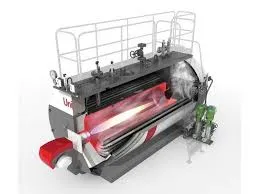
नोभ . 04, 2024 23:12 Back to list
steam boiler process
Understanding the Steam Boiler Process
Steam boilers are an integral part of many industrial processes, serving as a crucial source of heat and power. The steam boiler process involves converting water into steam through the application of heat, allowing for a range of applications including electricity generation, heating, and various industrial processes. In this article, we will explore how steam boilers function, their components, and their importance in various sectors.
The Basics of Steam Generation
The primary function of a steam boiler is to generate steam by heating water. This process typically involves the combustion of fuel or the use of electrical energy to produce heat. The generated steam can then be directed to perform mechanical work or provide heating. The efficiency of a steam boiler is crucial, as it affects operational costs and environmental impact.
Key Components of a Steam Boiler
A typical steam boiler comprises several key components that work together to ensure efficient operation
1. Burner The burner is responsible for the combustion process, providing the heat necessary to convert water into steam. Different types of burners can accommodate various fuel types, including natural gas, oil, and biomass.
2. Boiler Drum The boiler drum is a chamber where water is heated to produce steam. It contains water and steam separation systems that allow for the efficient collection and monitoring of steam pressure.
3. Heat Exchanger This component transfers heat from the hot gases produced by combustion to the water in the boiler, increasing its temperature and, eventually, converting it to steam.
4. Control Systems Modern steam boilers are equipped with advanced control systems that monitor and regulate the boiler’s performance, ensuring optimal efficiency and safety. These systems manage fuel supply, water levels, pressure, and temperature.
5. Safety Devices Safety is paramount in boiler operation. Safety valves, pressure gauges, and water level monitors are essential to prevent accidents and ensure safe functioning.
steam boiler process

The Steam Generation Process
The steam generation process typically follows these steps
1. Fuel combustion The process begins with the combustion of fuel in the burner. This produces hot gases that flow through the heat exchanger.
2. Heat transfer As the hot gases pass through the heat exchanger, they transfer their heat to the water in the boiler drum. The water temperature rises, causing it to convert into steam.
3. Steam collection The steam rises and collects at the top of the boiler. It is essential to keep the pressure within the boiler at optimal levels to enhance efficiency and prevent damage.
4. Utilization of steam The steam produced can be used in various applications, such as powering turbines in electricity generation, providing heating for industrial processes, or supplying steam for heating systems in buildings.
Importance of Steam Boilers in Industry
Steam boilers play a vital role across many industries, including power generation, chemical processing, food and beverage production, and pharmaceuticals. Their ability to produce high-pressure steam allows for efficient energy utilization, making them a critical component in modern manufacturing and energy systems.
Moreover, advancements in boiler technologies, such as increased efficiency and reduced emissions, are helping to support sustainability initiatives in various sectors. As industries strive for greener solutions, the evolution and enhancement of steam boiler processes remain crucial.
In conclusion, the steam boiler process is a fundamental element of many industrial operations, facilitating energy production and heating. Understanding its components and functions is essential for optimizing efficiency, ensuring safety, and contributing to the overall effectiveness of industrial processes. As technologies continue to evolve, the role of steam boilers will likely adapt, further enhancing their efficiency and environmental friendliness.
-
High-Efficiency Commercial Oil Fired Steam Boiler for Industry
NewsJul.30,2025
-
High-Efficiency Biomass Fired Thermal Oil Boiler Solutions
NewsJul.30,2025
-
High Efficiency Gas Fired Thermal Oil Boiler for Industrial Heating
NewsJul.29,2025
-
High-Efficiency Gas Fired Hot Water Boiler for Sale – Reliable & Affordable
NewsJul.29,2025
-
High Efficiency Biomass Fired Hot Water Boiler for Industrial and Commercial Use
NewsJul.29,2025
-
High-Efficiency Biomass Fired Hot Water Boiler for Industrial Use
NewsJul.28,2025
Related PRODUCTS






















